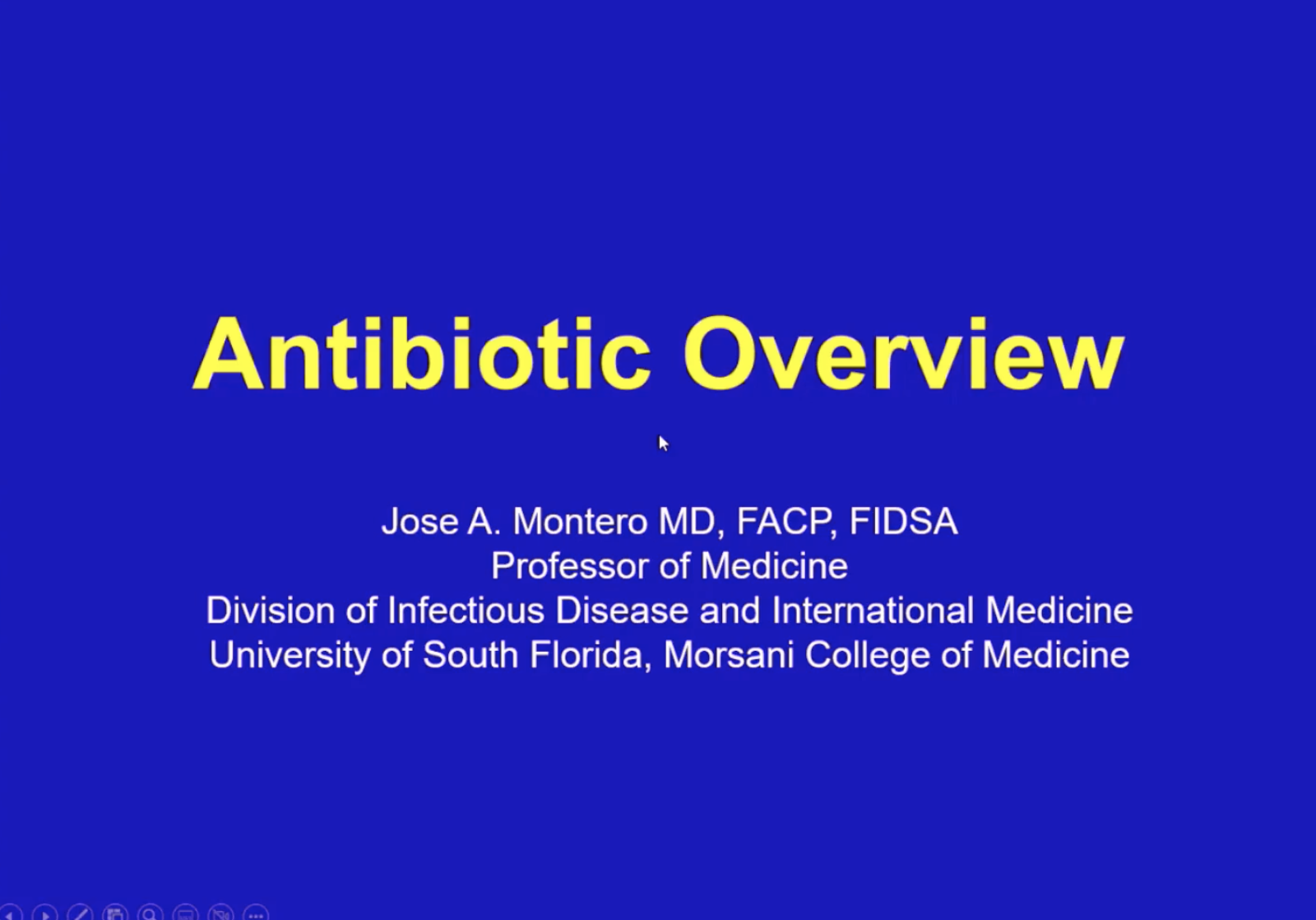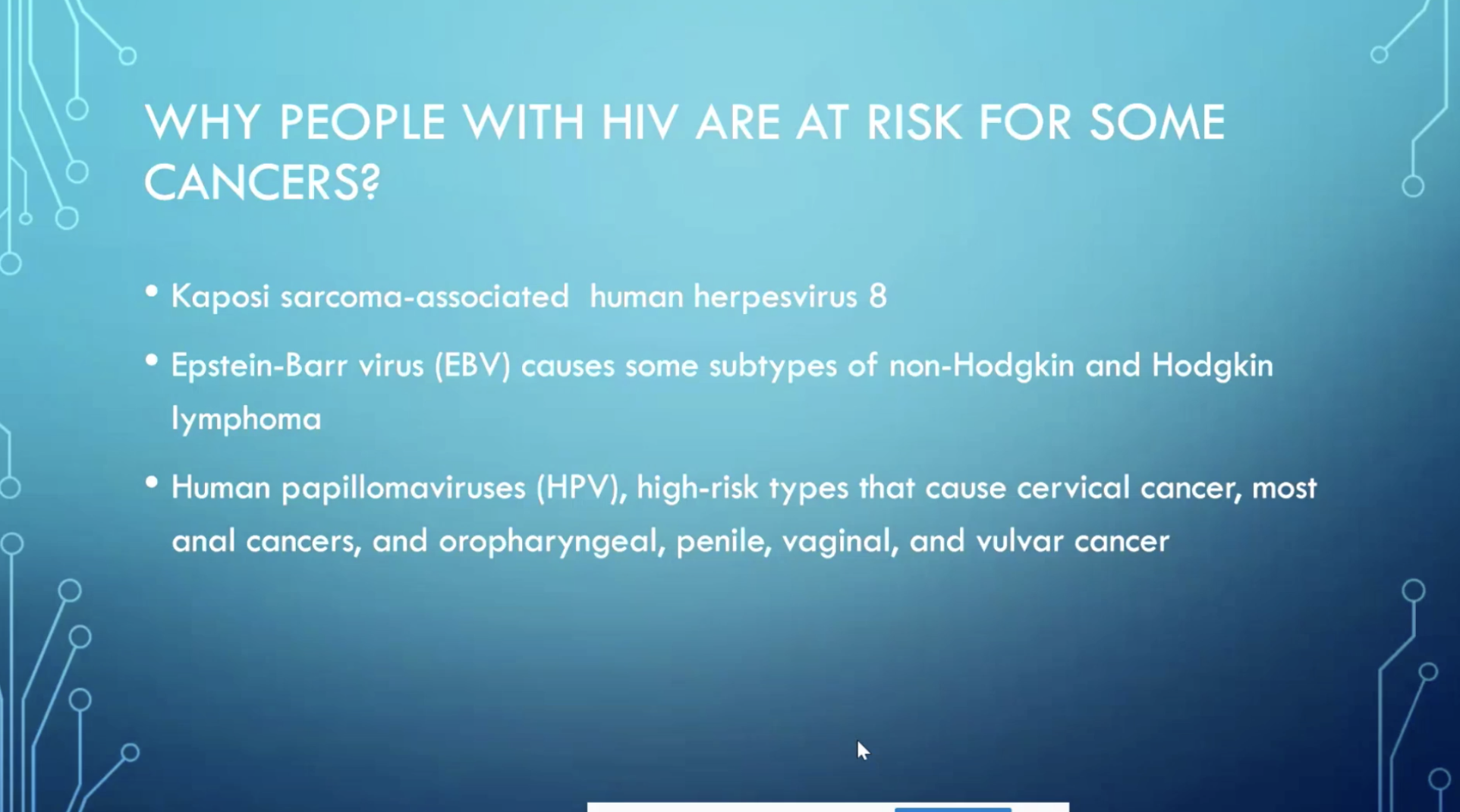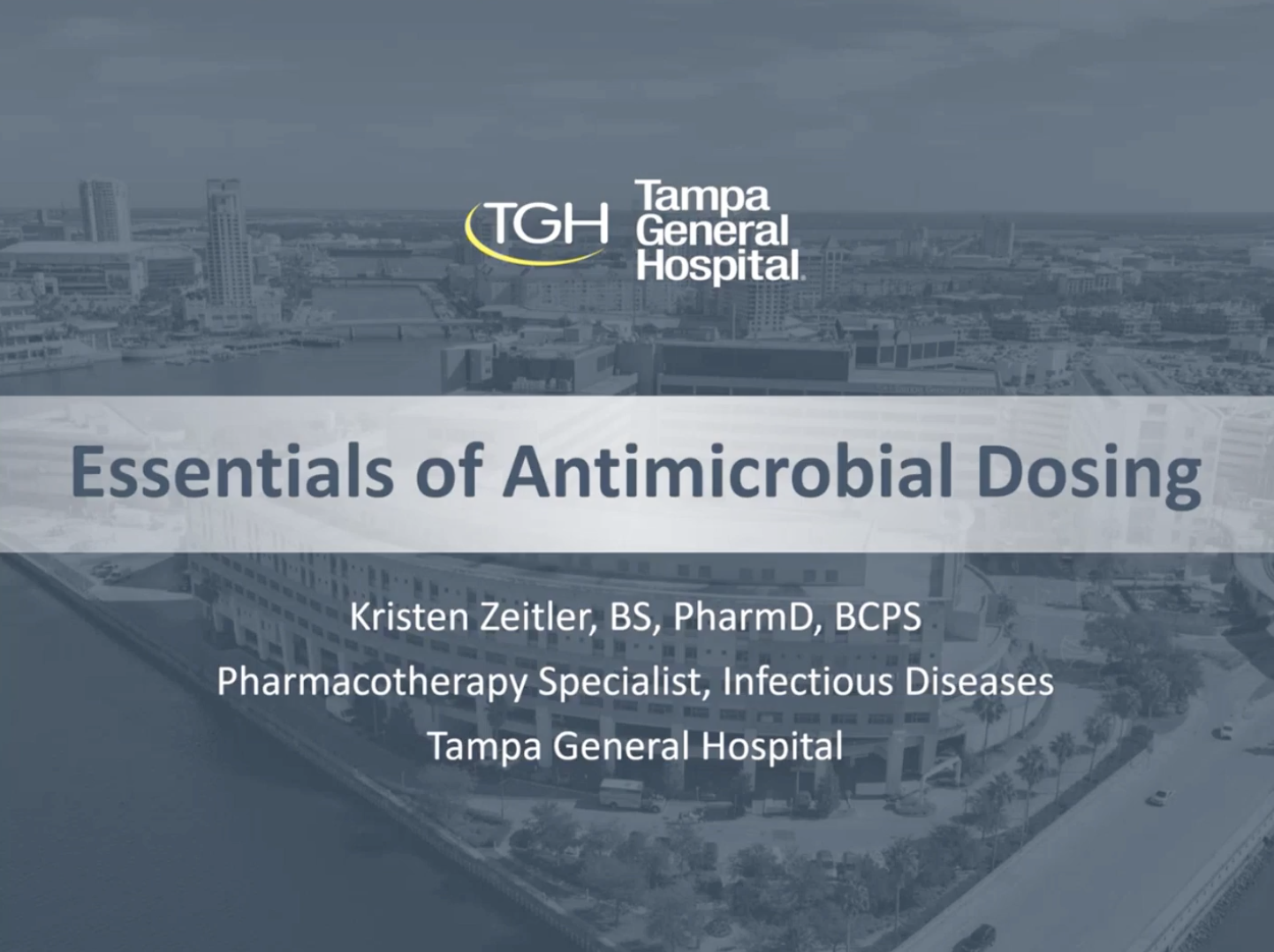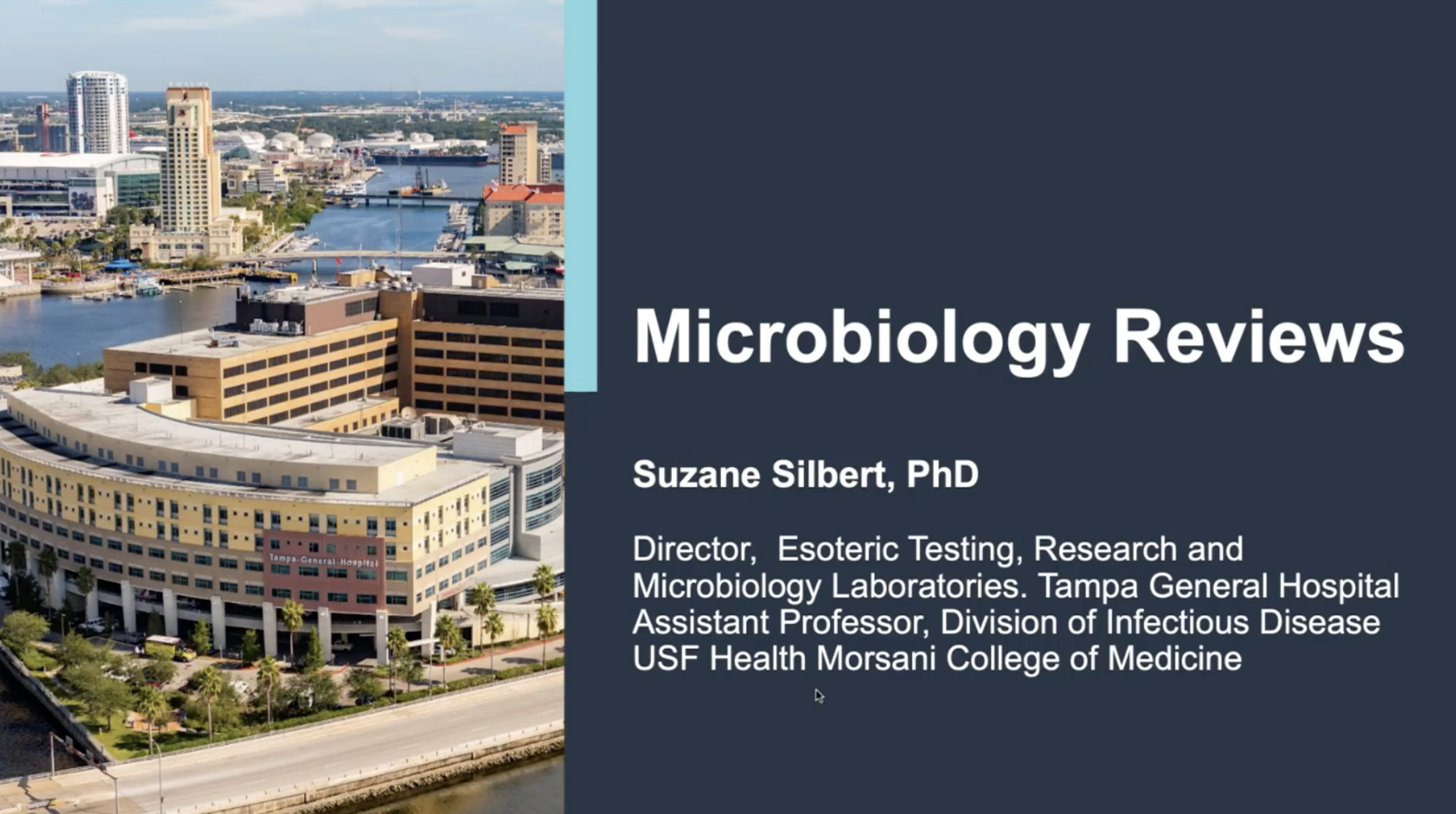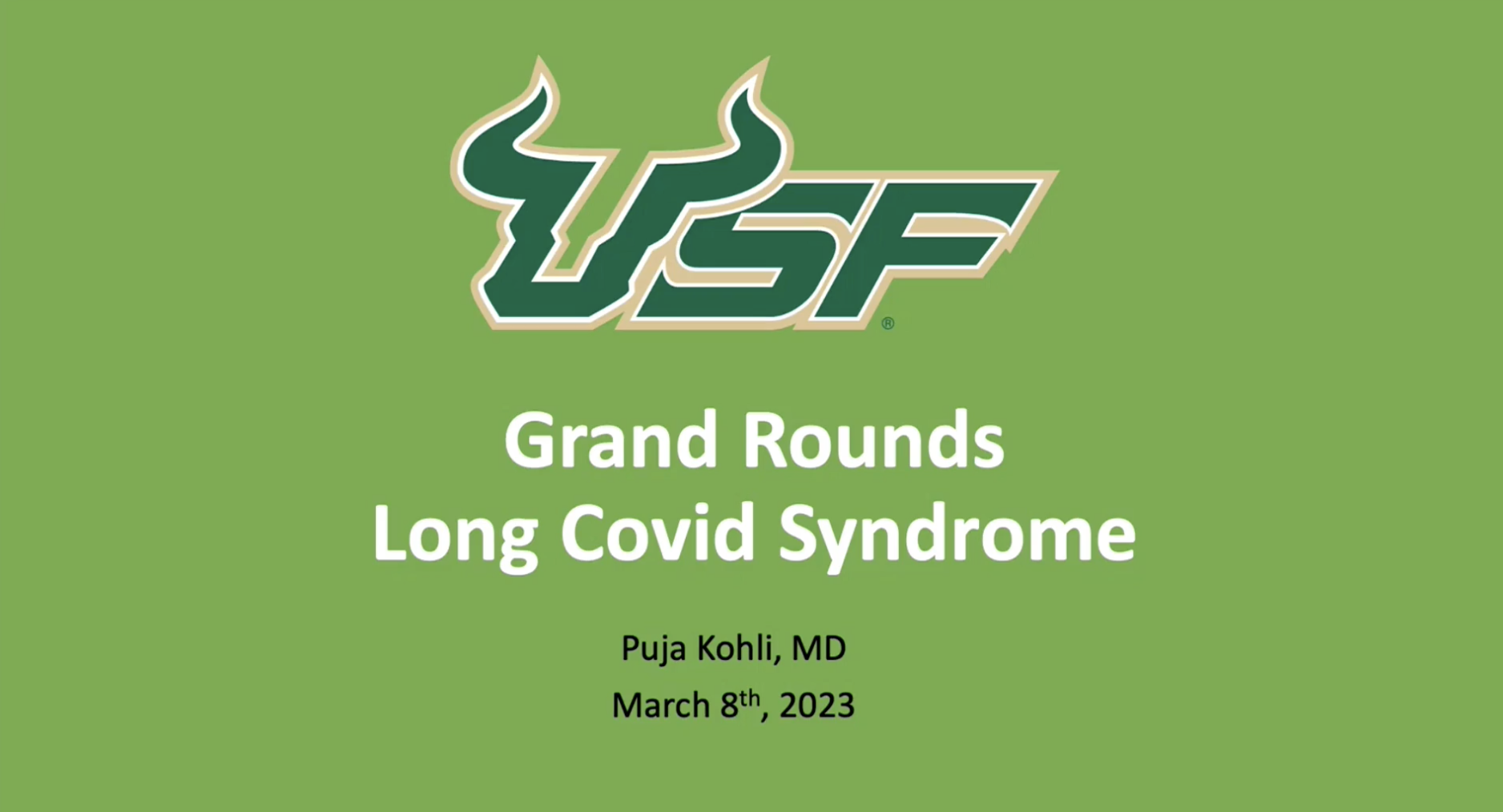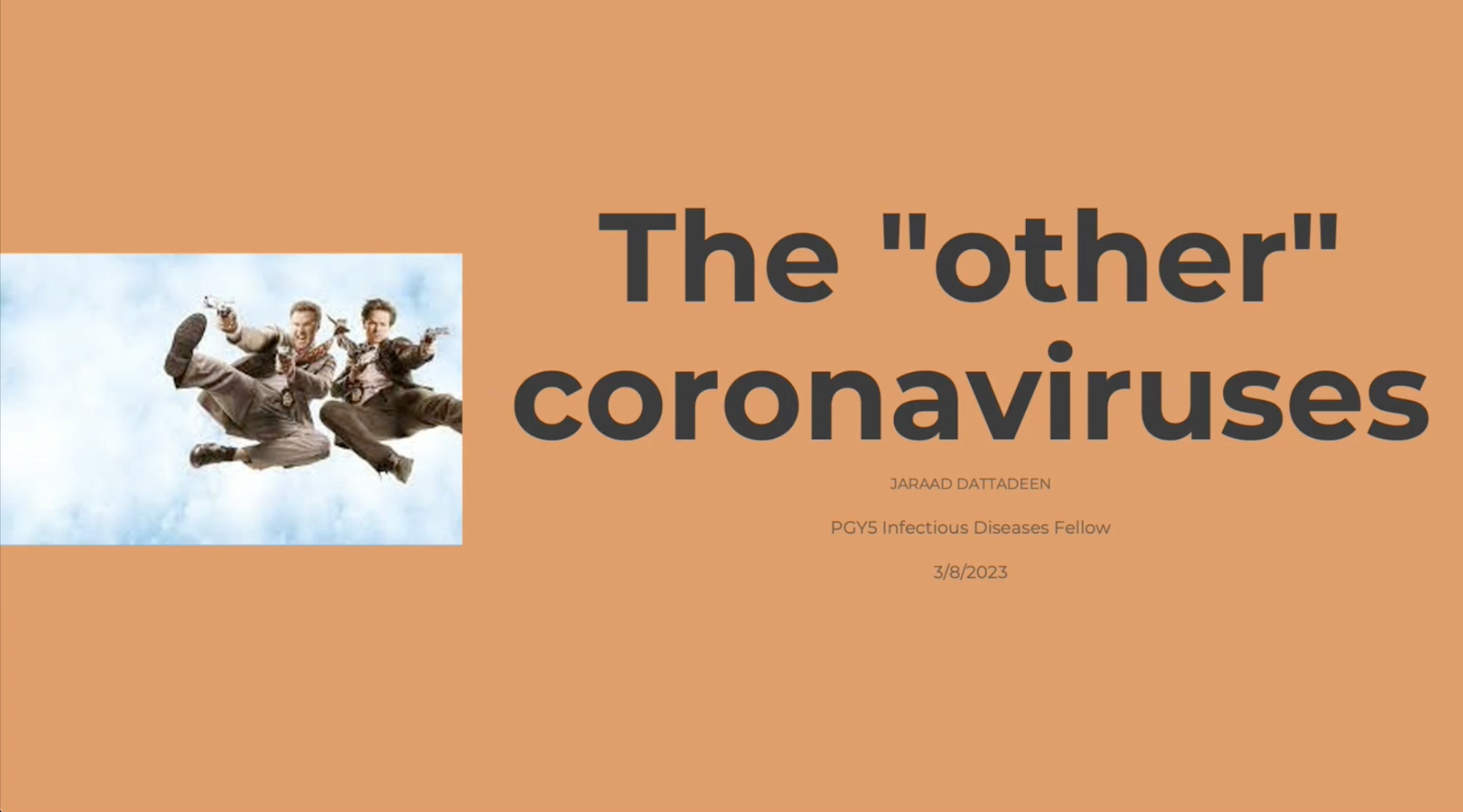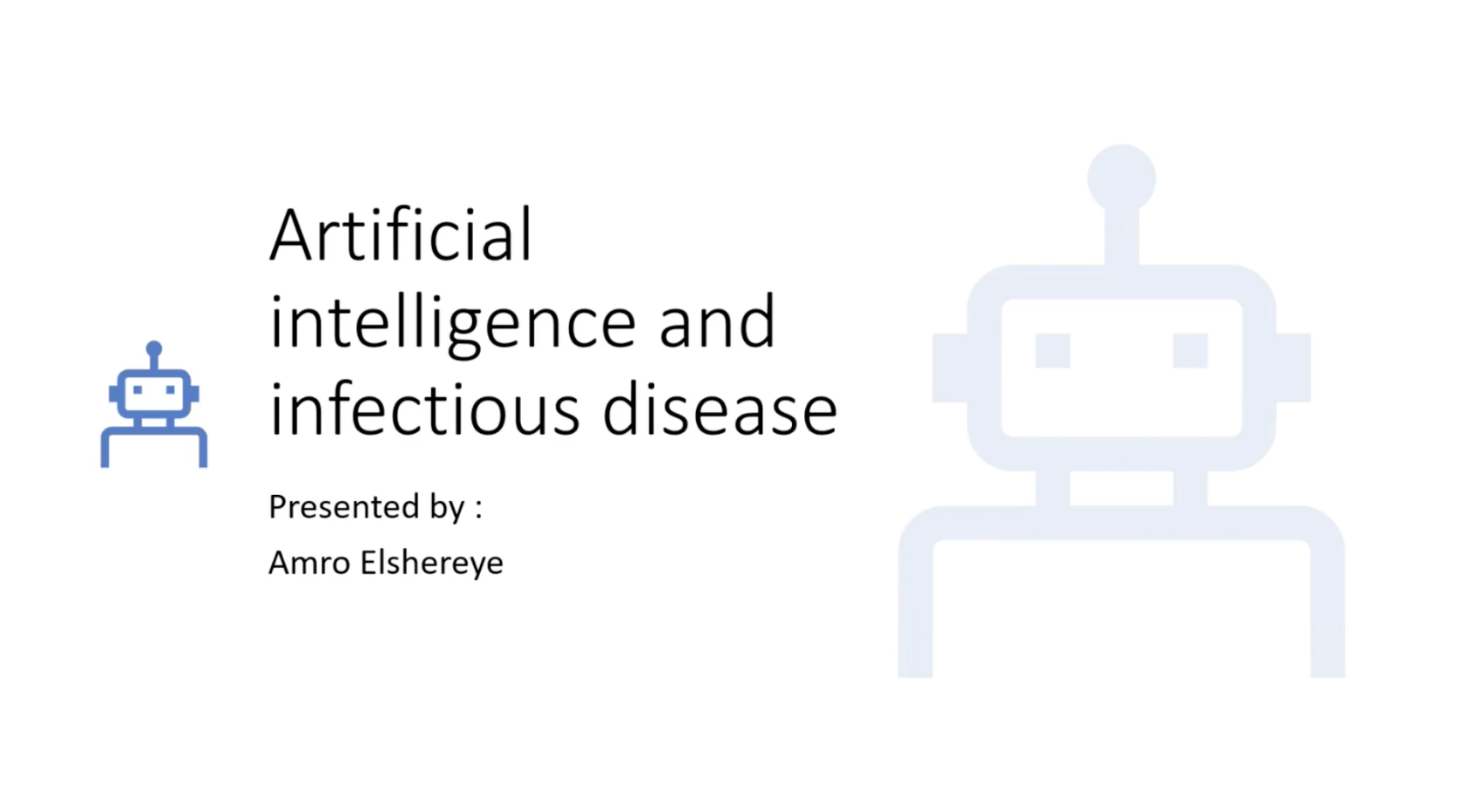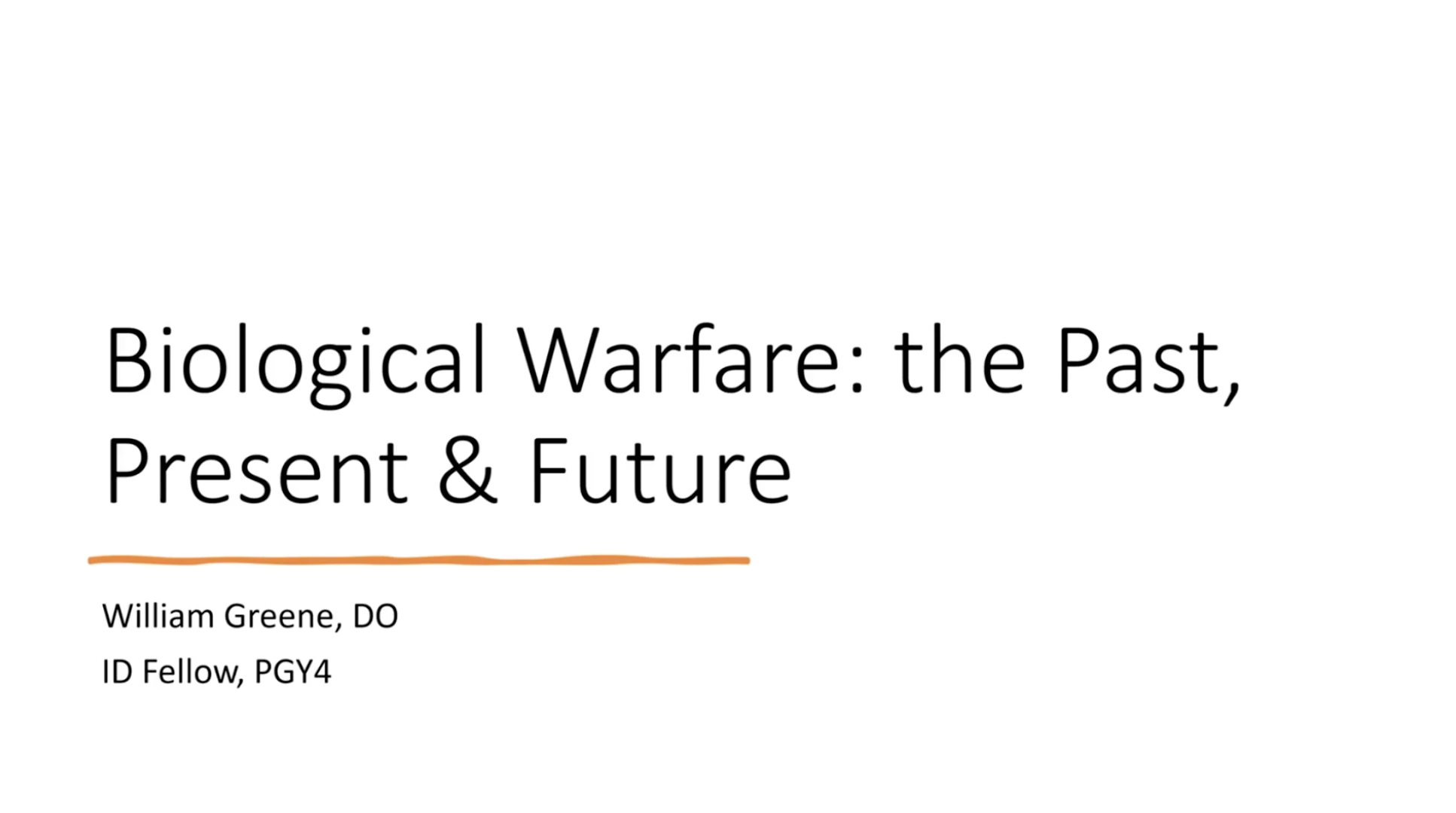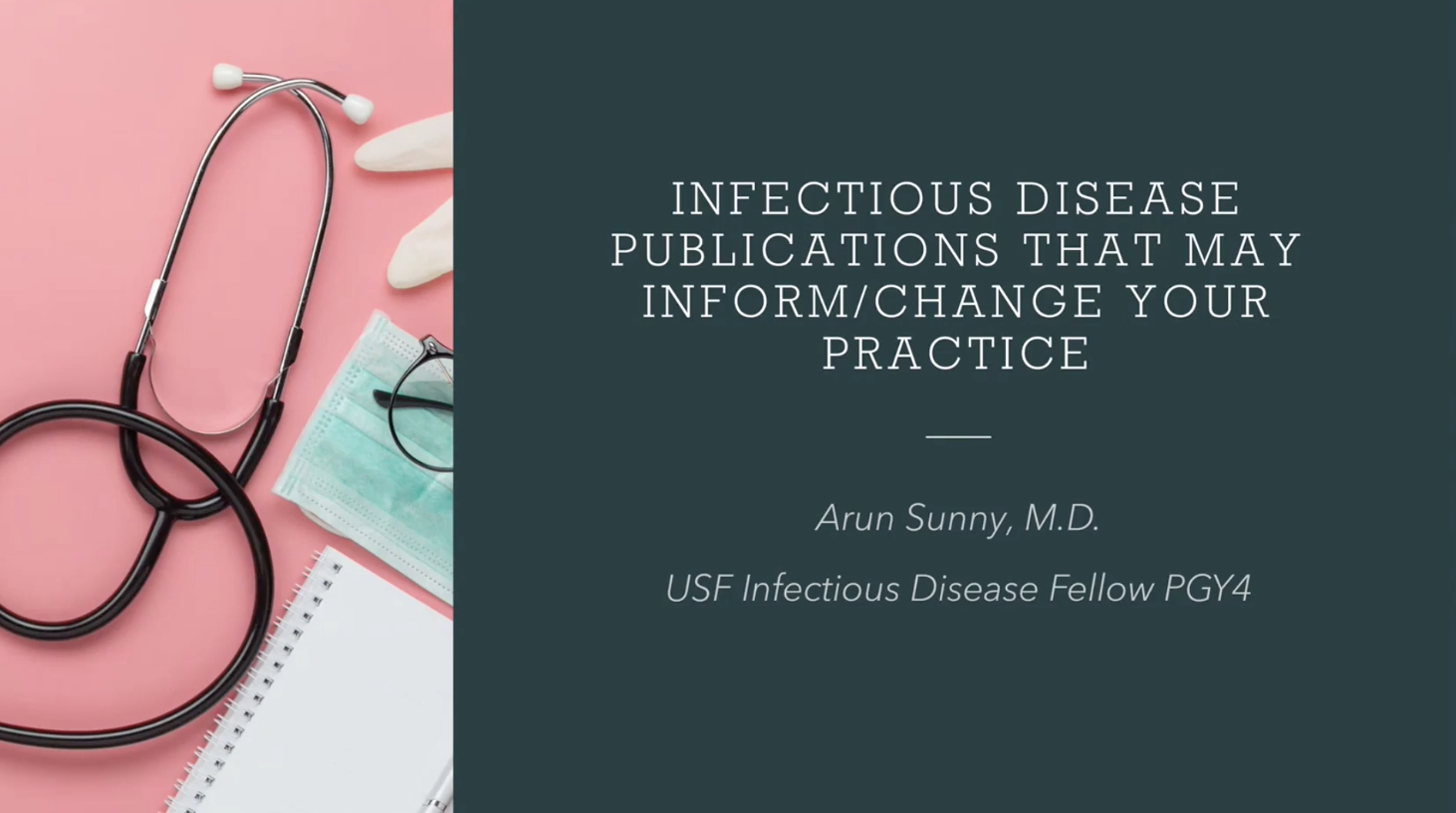Dr. Kami Kim, Chief of the USF’s Division of Infectious Diseases and International Medicine, presents an update on Malaria and fever in the returning traveller. Dr. Kim begins her talk by presenting an overview of the tropical infections associated with a febrile presentation. She then discusses the work up if the returning traveller with fever, including essential elements of the history, physical exam, and laboratory workup. She then reviews the history of malaria and then moves on to malaria epidemiology. The life cycle of malaria is presented, and then the factors associated with transmission are reviewed. Malaria diagnostics are also discussed. Lastly, Dr. Kim closes by contrasting the distinctions between the individual malaria species (falciparum, malariae, ovale, knowlesi) and their clinical spectrums of disease.
Archives
Overview of Antibiotics
Dr. Jose Montero, Professor of Medicine at the Division of Infectious Diseases, Morsani College of Medicine, presents a basic review of anti-infective agents. Dr. Montero begins by discussing the initial assessment of antibiotic choice, related to broad versus narrow spectrum coverage, allergy assessement, and awareness of normal flora versus pathogens. Next, he discusses MIC interpretation and mechanisms of resistance. Dr. Montero then covers each of the major antibiotic classes, including cephalosporins, carbapenems, flouroquinolones, aminoglycosides, gloycopeptines, and oxazolidinones. Lastly, Dr. Montero discusses antibiotic agents used for the coverage of highly resistant bacteria. Cost information about antibiotic agents is also shared.
HIV and Malignancy
Dr. Ana Velez, Professor of Medicine and Infectious Diseases Clinician at Moffitt Cancer Center and Research Institute, discusses the association between malignancies and Human Immunodeficiency Virus Infection. Dr. Velez begins by discussing that factors in HIV disease and stimulate the formation of cancers. Next, Dr. Velez discusses AIDS defining maligancies, including Kaposi sarcoma, Non-Hodgekin Lymphoma, and cervical cancer. Dr. Velez then discusses lung cancer and head and neck cancer in HIV disease, and speculates on the reasons for poorer outcomes in these patients. Lastly, state of the art therapies for malignancy treatment in HIV patients are discussed, including stem cell transplantation and CAR-T therapy.
Essentials of Antibiotic Dosing
Dr. Kristen Zeitler, a pharmacist and pharmacotherapy specialist at Tampa General Hospital, discusses basic information about how to properly dose antimicrobial agents in hospital patients. Dr. Zietler begins by discussing the role that ID clinical pharmacist play in hospitals. She then compares and contrasts the differences between pharmacokinetics (PK) and pharmacodynamics (PD). The principles of pharmacokinetics are then covered, with regard to absorption, distribution, metabolism, and elimination. Next, PK/PD concepts are explored, especially as it relates to Vancomycin. Lastly, adjustment of dosing in renal insufficiency or dialysis is explored.
Basic Principles of Microbiology
Dr. Suzanne Silbert, Microbiology Director for Tampa General Hospital, presents this introductory talk on the basics of the microbiology lab. Dr. Silbert begins with an overview of clinical microbiology, and then reviews the basic classification standards for bacterial organisms, viruses and fungi. She then goes on to discuss culture cultivation techniques, including the use of liquid, solid, or semi-solid media. The speaker then covers identification systems for bacterial organisms, including MALDI-TOF, Disk-Diffusion, and molecular diagnostic techniques. A robust question and answer session concludes the session
Long Covid Syndrome
Dr. Puja Kohli, Infectious Diseases Fellow at the University of South Florida Division of Infectious Diseases, provides an update on Long Covid Syndrome. Dr. Kohli begins by discussing what is believed to be the pathophysiology of long Covid, including the immunology behind the long manifestations of the disorder. She then breaks down the specific features of long Covid syndrome by organ system, including respiratory, cardiovascular, hematologic, CNS, renal, and GI manifestations. She then discusses specific treatments for long Covid, including proactive strategies as well as some of the debunked treatments that continue to be used by some communities outside of mainstream medicine. Other treatments are also discussed, including antibiotics, monoclonal antibodies, and SSRIs.
The “Other” Coronaviruses
Dr. Jaraad Dattadeen, Infectious Diseases Senior Fellow at the Division of Infectious Diseases at the USF College of Medicine, discusses coronaviruses other than SARS-CoV2. Dr. Dattadeen begins by discussing the general classification of Coronaviruses as well as their microbiology. The speaker covers SARS CoV-1, MERS, as well as HCoV-OC43, HCoV-229, HCoV-NL63, and HCoV-HKU1. Each virus subtype is compared with SARS-CoV2. The intermediate hosts and reservoirs of select coronaviruses are also discussed.
Artificial Intelligence and Infectious Disease
Dr. Amro Elshereye, Infectious Diseases Fellow at the Morsani USF College of Medicine, explores the burgeoning field of artificial intelligence (AI) in medicine in this interactive presentation and faculty discussion. The speaker begins by discussing early warning systems such as Healthmap which utilize AI to predict developing outbreaks. Next, Dr Elshereye explains voice recognition technology in medicine, including AI-powered transcription systems such as Dragon Medical One. The discussion then moves on to generative transformer technology including ChatGPT, which could revolutionize many fields of health practice, including consultation, doctor-patient communication, and diagnostic interpretation. Lastly, Dr. Elshereye also explores the drawbacks of artificial intelligence and some of the grave predictions many technology thought leaders have made if guardrails are not put in place soon enough for AI.
Biological Warfare: Past, Present and Future
Dr. William Greene, Infectious Diseases Fellow at the USF Morsani College Medicine, discusses biological weapons in this new podcast. After defining the concept of a bioweapon, Dr. Greene first discusses the extensive history of bioweapons, starting in ancient times, extending through the middle ages, through the world wars, and beyond the cold war to the present day. Next, Dr. Greene categorizes biologic terrorism agents by their CDC category, and discusses current bioterrorism threats. These include Anthrax, Plague, and Smallpox. Specific treatments to these infections are also discussed.
Notable Recent Studies that Could Affect Your Practice
Dr Arun Sunny, infectious diseases fellow at the USF Morsani Division of Infectious Diseases, discusses three main publications that could change the practice habits of an Infectious Diseases specialist. The three publications involve: (1) The use of post-exposure doxycycline to prevent sexually transmitted infections; (2) The use of hydrocortisone for severe community acquired pneumonia; (3) Early lead extraction for infected implanted electronic devices; and (4) The effects of early sign-offs (discontinuation of care) of infectious diseases consultants. The presentation includes a lively discussion from participants on the merits and pitfalls of each of the presented studies.

